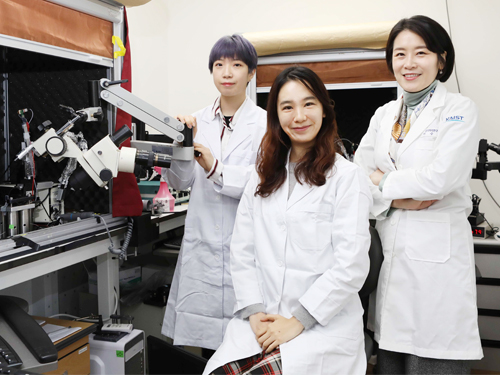cognitive+behavior
-
 A Study Finds Neuropeptide Somatostatin Enhances Visual Processing
Researchers have confirmed that neuropeptide somatostatin can improve cognitive function in the brain. A research group of Professor Seung-Hee Lee from the Department of Biological Sciences at KAIST found that the application of neuropeptide somatostatin improves visual processing and cognitive behaviors by reducing excitatory inputs to parvalbumin-positive interneurons in the cortex.
This study, reported at Science Advances on April 22nd (EST), sheds a new light on the therapeutics of neurodegenerative diseases. According to a recent study in Korea, one in ten seniors over 65 is experiencing dementia-related symptoms in their daily lives such like memory loss, cognitive decline, and motion function disorders. Professor Lee believes that somatostatin treatment can be directly applied to the recovery of cognitive functions in Alzheimer’s disease patients.
Professor Lee started this study noting the fact that the level of somatostatin expression was dramatically decreased in the cerebral cortex and cerebrospinal fluid of Alzheimer’s disease patients
Somatostatin-expressing neurons in the cortex are known to exert the dendritic inhibition of pyramidal neurons via GABAergic transmission. Previous studies focused on their inhibitory effects on cortical circuits, but somatostatin-expressing neurons can co-release somatostatin upon activation. Despite the abundant expression of somatostatin and its receptors in the cerebral cortex, it was not known if somatostatin could modulate cognitive processing in the cortex.
The research team demonstrated that the somatostatin treatment into the cerebral cortex could enhance visual processing and cognitive behaviors in mice. The research team combined behaviors, in vivo and in vitro electrophysiology, and electron microscopy techniques to reveal how the activation of somatostatin receptors in vivo enhanced the ability of visual recognition in animals. Interestingly, somatostatin release can reduce excitatory synaptic transmission to another subtype of GABAergic interneurons, parvalbumin (PV)-expressing neurons.
As somatostatin is a stable and safe neuropeptide expressed naturally in the mammalian brain, it was safe to be injected into the cortex and cerebrospinal fluid, showing a potential application to drug development for curing cognitive disorders in humans.
Professor Lee said, “Our research confirmed the key role of the neuropeptide SST in modulating cortical function and enhancing cognitive ability in the mammalian brain. I hope new drugs can be developed based on the function of somatostatin to treat cognitive disabilities in many patients suffering from neurological disorders.”
This study was supported by the National Research Foundation of Korea.
Publication:
Song, Y. H et al. (2020) ‘Somatostatin enhances visual processing and perception by suppressing excitatory inputs to parvalbumin-positive interneurons in V1’, Science Advances, 6(17). Available online at https://doi.org/10.1126/sciadv.aaz0517
Profile:
Seung-Hee Lee
Associate Professor
shlee1@kaist.ac.kr
https://sites.google.com/site/leelab2013/
Sensory Processing Lab (SPL)
Department of Biological Sciences (BIO)
Korea Advanced Institute of Science and Technology (KAIST)
Profile:
You-Hyang Song
Researcher (Ph.D.)
dbgidtm17@kaist.ac.kr
SPL, KAIST BIO
Profile:
Yang-Sun Hwang
Researcher (M.S.)
hys940129@kaist.ac.kr
SPL, KAIST BIO
(END)
2020.04.23 View 13534
A Study Finds Neuropeptide Somatostatin Enhances Visual Processing
Researchers have confirmed that neuropeptide somatostatin can improve cognitive function in the brain. A research group of Professor Seung-Hee Lee from the Department of Biological Sciences at KAIST found that the application of neuropeptide somatostatin improves visual processing and cognitive behaviors by reducing excitatory inputs to parvalbumin-positive interneurons in the cortex.
This study, reported at Science Advances on April 22nd (EST), sheds a new light on the therapeutics of neurodegenerative diseases. According to a recent study in Korea, one in ten seniors over 65 is experiencing dementia-related symptoms in their daily lives such like memory loss, cognitive decline, and motion function disorders. Professor Lee believes that somatostatin treatment can be directly applied to the recovery of cognitive functions in Alzheimer’s disease patients.
Professor Lee started this study noting the fact that the level of somatostatin expression was dramatically decreased in the cerebral cortex and cerebrospinal fluid of Alzheimer’s disease patients
Somatostatin-expressing neurons in the cortex are known to exert the dendritic inhibition of pyramidal neurons via GABAergic transmission. Previous studies focused on their inhibitory effects on cortical circuits, but somatostatin-expressing neurons can co-release somatostatin upon activation. Despite the abundant expression of somatostatin and its receptors in the cerebral cortex, it was not known if somatostatin could modulate cognitive processing in the cortex.
The research team demonstrated that the somatostatin treatment into the cerebral cortex could enhance visual processing and cognitive behaviors in mice. The research team combined behaviors, in vivo and in vitro electrophysiology, and electron microscopy techniques to reveal how the activation of somatostatin receptors in vivo enhanced the ability of visual recognition in animals. Interestingly, somatostatin release can reduce excitatory synaptic transmission to another subtype of GABAergic interneurons, parvalbumin (PV)-expressing neurons.
As somatostatin is a stable and safe neuropeptide expressed naturally in the mammalian brain, it was safe to be injected into the cortex and cerebrospinal fluid, showing a potential application to drug development for curing cognitive disorders in humans.
Professor Lee said, “Our research confirmed the key role of the neuropeptide SST in modulating cortical function and enhancing cognitive ability in the mammalian brain. I hope new drugs can be developed based on the function of somatostatin to treat cognitive disabilities in many patients suffering from neurological disorders.”
This study was supported by the National Research Foundation of Korea.
Publication:
Song, Y. H et al. (2020) ‘Somatostatin enhances visual processing and perception by suppressing excitatory inputs to parvalbumin-positive interneurons in V1’, Science Advances, 6(17). Available online at https://doi.org/10.1126/sciadv.aaz0517
Profile:
Seung-Hee Lee
Associate Professor
shlee1@kaist.ac.kr
https://sites.google.com/site/leelab2013/
Sensory Processing Lab (SPL)
Department of Biological Sciences (BIO)
Korea Advanced Institute of Science and Technology (KAIST)
Profile:
You-Hyang Song
Researcher (Ph.D.)
dbgidtm17@kaist.ac.kr
SPL, KAIST BIO
Profile:
Yang-Sun Hwang
Researcher (M.S.)
hys940129@kaist.ac.kr
SPL, KAIST BIO
(END)
2020.04.23 View 13534 -
 KAIST to Open the Meditation Research Center
KAIST announced that it will open its Meditation Research Center next June. The center will serve as a place for the wellness of KAIST community as well as for furthering the cognitive sciences and its relevant convergence studies.
For facilitating the center, KAIST signed an MOU with the Foundation Academia Platonica in Seoul, an academy working for enriching the humanities and insight meditation on Aug.31. The Venerable Misan, a Buddhist monk well-known for his ‘Heart Smile Meditation’ program, will head the center.
The center will also conduct convergence research on meditation, which will translate into brain imaging, cognitive behavior, and its psychological effects. Built upon the research, the center expects to publish textbooks on meditation and will distribute them to the public and schools in an effort to widely disseminate the benefits of meditation.
As mindful meditation has become mainstream and more extensively studied, growing evidence suggests multiple psychological and physical benefits of these mindfulness exercises as well as for similar practices. Mind-body practices like meditation have been shown to reduce the body’s stress response by strengthening the relaxation response and lowering stress hormones.
The Venerable Misan, a Ph.D in philosophy from Oxford University, also serves as the director of the Sangdo Meditation Center and a professor at Joong-Ang Sangha University, a higher educational institution for Buddhist monks.
Monk Misan said that meditation will play a crucial part in educating creative students with an empathetic mindset. He added, “Hi-tech companies in Silicon Valley such as Google and Intel have long introduced meditation programs for stress management. Such practices will enhance the wellness of employees as well as their working efficiency.”
President Sung-Chul Shin said of the opening of the center, “From long ago, many universities in foreign countries including Havard, Stanford, Oxfor universities and the Max Planck Institute in Germany have applied scientific approaches to meditation and installed meditation centers. I am pleased to open our own center next year and I believe that it will bring more diverse opportunities for advancing convergent studies in AI and cognitive sciences.
2017.08.31 View 6539
KAIST to Open the Meditation Research Center
KAIST announced that it will open its Meditation Research Center next June. The center will serve as a place for the wellness of KAIST community as well as for furthering the cognitive sciences and its relevant convergence studies.
For facilitating the center, KAIST signed an MOU with the Foundation Academia Platonica in Seoul, an academy working for enriching the humanities and insight meditation on Aug.31. The Venerable Misan, a Buddhist monk well-known for his ‘Heart Smile Meditation’ program, will head the center.
The center will also conduct convergence research on meditation, which will translate into brain imaging, cognitive behavior, and its psychological effects. Built upon the research, the center expects to publish textbooks on meditation and will distribute them to the public and schools in an effort to widely disseminate the benefits of meditation.
As mindful meditation has become mainstream and more extensively studied, growing evidence suggests multiple psychological and physical benefits of these mindfulness exercises as well as for similar practices. Mind-body practices like meditation have been shown to reduce the body’s stress response by strengthening the relaxation response and lowering stress hormones.
The Venerable Misan, a Ph.D in philosophy from Oxford University, also serves as the director of the Sangdo Meditation Center and a professor at Joong-Ang Sangha University, a higher educational institution for Buddhist monks.
Monk Misan said that meditation will play a crucial part in educating creative students with an empathetic mindset. He added, “Hi-tech companies in Silicon Valley such as Google and Intel have long introduced meditation programs for stress management. Such practices will enhance the wellness of employees as well as their working efficiency.”
President Sung-Chul Shin said of the opening of the center, “From long ago, many universities in foreign countries including Havard, Stanford, Oxfor universities and the Max Planck Institute in Germany have applied scientific approaches to meditation and installed meditation centers. I am pleased to open our own center next year and I believe that it will bring more diverse opportunities for advancing convergent studies in AI and cognitive sciences.
2017.08.31 View 6539